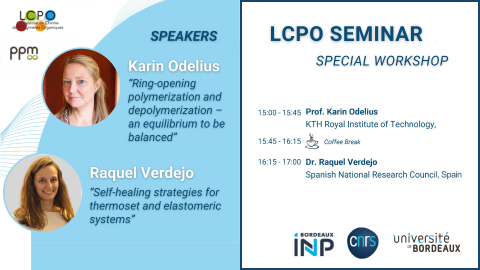Ring-opening polymerization and depolymerization – an equilibrium to be balanced
Karin ODELIUS
KTH Royal Institute of Technology, Stockholm - webpage
Abstract: As we strive to close the polymeric material loop, the search for recycling methodologies where material properties are retained even after multiple recycling cycles is ongoing. Mechanical recycling is considered the most cost and energy efficient recycling route, nevertheless, many obstacles remain unsolved. Within this setting, chemical recycling is deemed a complement when mechanical recycling no longer is an option due to property loss – but at times it could also be the method of choice. The aliphatic polyesters and polycarbonates are often highlighted as materials for the future where chemical recycling is a viable first recycling option. In this presentation, some of our recent work on ring-opening polymerization and depolymerization will be discussed highlighting both their opportunities and challenges.
///
Self-healing strategies for thermoset and elastomeric systems
Raquel VERDEJO
Institute of Polymer Science and Technology, CSIC, Madrid - webpage
Abstract: Self-healing strategies are currently gaining widespread attention as an alternative to improving the environmental impact of thermosets and elastomers. Here, I will present several studies aimed at providing self-healing capabilities to these systems as a way of extending the lifecycle of the products, as well as for reducing the amount of waste generated. These approaches leverage both intrinsic and extrinsic strategies to enable autonomous or stimulus-triggered recovery of mechanical properties after damage.
///
Comité d'organisation et contacts :
- Henri Cramail : henri.cramail@enscbp.fr
- Daniel Taton : taton@enscbp.fr
- Thomas Vidil: thomas.vidil@enscbp.fr
Flyer
Dernière mise à jour :


